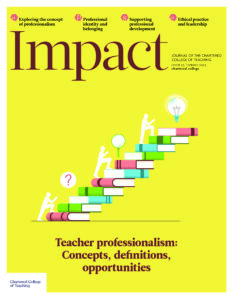KATHRYN TAYLOR, EdD CANDIDATE, UNIVERSITY COLLEGE LONDON, UK
The term ‘professionalism’ is laden with political values and assumptions (Sachs, 2001). Conceived of and described in complex, conflated and contradictory ways (Law, 2004), teacher ‘professionalism’ has myriad influences, promoting agendas including standardisation (e.g. DfEDepartment for Education - a ministerial department responsible for children’s services and education in England, 2013), aspirational developmental frameworks (Forde et al., 2016), vocational flourishing (Evans, 2011), practical wisdom (Green, 2009), activism (Buchanan, 2015; Mockler, 2011) and specialist skills and knowledge (Freidson, 2004).
Without considering the nature of teacher professionalism and how we identify with it, it is difficult to understand our place in the ‘system’. Recent thinking about psychological safety (Edmondson, 2019) and organisational match quality (the extent to which individuals feel that their values align with those of their organisation) indicates the importance of working environments on teachers’ sense of self-efficacy. Epstein (2019) suggests that match quality is a greater indicator of positive self-beliefs and performance than qualifications or experience. Environments bringing personal and organisational assumptions about professionalism into conflict undermine these self-beliefs, damaging motivation, wellbeing and even health (Ball, 2008).
Competing and incompatible professional paradigms
Teaching is experiencing an ‘expectation vs. reality’ problem, and the recruitment and retention crisis is biting the sector – hard. A vocational ‘secular’ calling often motivates teachers (Freidson, 2004), and many feel a deep emotional and moral purpose (Hargreaves, 1998). However, the desire to inspire becomes frustrated by bureaucratic, standardised realities, stifling individuals’ creativity. Consequently, many leave or consider leaving the profession (Perryman and Calvert, 2020). Teacher recruitment and retention is complex. One source of discord is rooted in competing professional paradigms within the English education system. Teacher professionalism can be broadly conceptualised as traditional, managerial or democratic (Sachs, 2001). I suggest that embracing democratic professionalism, which entails high-quality CPD and seeks to demystify practice, is fundamental to addressing the ills of both managerialism and traditionalism. Democratic professionalism promotes enhanced teacher agency (noticing what can be done) through the development of comprehensive understanding of research-informed practices.
Traditional professionalism holds that specialist expertise, gained through experience, is key. A ‘closed shop’ mindset can lead some to conflate experience with expertise, inhibiting professional learning (Evans, 2008). New initiatives and pedagogies, and experiences of mentoring and coaching, can feel like personal challenges to competence. Teachers may experience learning anxiety, because changing practices risks temporary incompetence while developing new skills (Schein, 2017). This is uncomfortable at best, and can be disastrous for workload, as teachers add new, organisationally mandated ‘best practices’ to existing ones, rather than changing or de-implementing pedagogies (Hamilton et al., 2024). People are creatures of habit, and it can be easier to stick to ‘tried and tested’ practices, especially in the domain of your own classroom, where you perceive that they have always served you well (Anthony et al., 2018).
Traditional professional confidence is challenged by the managerial professional paradigm, dominant in the English education system over the past four decades. Managerialism drives standardisation and efficiency and is criticised as narrowing and technicalising teacher practices (Evans, 2011). The efficiency drive of managerialism conflicts with traditionalism, which depends upon experience nurtured and developed over time (Freidson, 2004). Learning anxiety is compounded when accompanied by the threat of judgement, and perhaps reputational or disciplinary sanctions or organisational financial penalties (e.g. through falling pupil numbers) (Schein, 2017). This can lead some teachers to actively resist professional development, which can be experienced as a ‘tick box’ exercise ‘for Ofsted’. The resulting cognitive dissonance experienced by traditional professionals in a managerialist system leads, disastrously, to cynicism, burn-out, ill health and reform-rejection (Ball, 2008; 2016).
Fortunately, a third perspective has emerged during the past 25 years: democratic professionalism (Sachs, 2001). This activist, research-informed paradigm promotes demystification of teacher practices. It is collaborative and creative, promotes agency and is associated with teacher wellbeing (Sullanmaa et al., 2023). Working to develop professional understanding together is difficult. It requires logistical support and commitment and deliberate curation by school leaders (Wolthuis et al., 2020)
If you are reading this publication, there is a good chance that you already align to the values of democratic professionalism, which entails research engagement. However, democratic professionalism is most beneficial as a collective rather than an individual endeavour, and whether we can realise the benefits depends very much on the school or departmental culture in which we work. Hökkä and Vähäsantanen (2014) describe organisational coupling arrangements that teachers might experience. Tight coupling is associated with managerial professionalism. It entails controls that limit teacher agency, such as ‘non-negotiable’ lesson protocols and other corporately mandated practices. At the other end of the spectrum, loosely coupled arrangements are associated with traditional professional assumptions. These are characterised by extensive individual teacher autonomy in a laissez-faire environment, which tends to conflate teacher experience and expertise. In the ‘Goldilocks zone’ sits balanced or agent-centred organisational coupling, associated with the democratic professional paradigm. Such cultures are characterised by the curation of a purposeful, research-informed, shared vision. This is co-created by stakeholders in response to local needs and is steered by reflection and reflexivityReflexivity draws attention to the researcher, rather than pretending that they they did not influence the research. It involves an examination of how the researcher's own beliefs, judgments and practices may have influenced the research..
Organisational cultures can be highly resistant to change interventions (Schein, 2017). Giddens (1984) argues that human culture evolves through structuration processes, which entail the iterative generation and reflection on cultural artefacts, such as data. While loose coupling allows school cultures to ‘drift with the tide’ and tightly coupled arrangements corral and curate them, all social systems are iterated through underpinning structuration processes. These processes occur naturally within social systems but can be used to ‘steer’ a culture over time. I suggest that democratic professionalism, realised in schools through balanced coupling, ‘leans into’ the sociological processes that underpin the generation and iteration of human culture, leveraging a natural advantage.
Mechanisms supportive of steering school cultures towards democratic professionalism include well-designed and delivered research-informed professional development curricula for teachers. Importantly, beyond the curation of ‘best bets’ from research, democratic professionalism requires deliberate nurturing. Leaders should plan for and protect structured opportunities for teacher reflection, evaluation and contextualisation of interventions. This is essential in supporting teachers to incorporate new strategies as ‘tools in their toolkit’, to be deployed wisely and with their professional judgement, rather than through managerialist-style ‘non-negotiables’.
Organisational match quality
Teachers, each with complex, contradictory and dynamic professional identities, are nested within their school cultures. Match quality is significant in the extent to which individuals feel that they belong within organisational culture, and people struggle to thrive in contexts that do not reflect their fundamental values (Epstein, 2019). Thus, teachers espousing traditional professional identities may intuitively align with ‘loose’ cultures, enjoying autonomous professional freedom and limited direct scrutiny. Those with democratic identities, seeking active participation in professional discourse, may prefer agent-centred school cultures.
Given that myriad factors influence professional identities, including macro-professional paradigms, the likelihood of match quality is challenging. Evans’ (2011) study of teacher professionalism exemplifies significant disparities between teachers’ conceptualisations of professionalism (including intellectual and attitudinal aspects) and the narrower range of professional behaviours valued in the managerial context. It follows that if, as Evans (2011) argues, the conceptual scope of teacher professionalism persists more broadly than it is defined within the managerial paradigm, then traditional or democratically aligned teachers may reject the performativity of tightly coupled arrangements (Ball, 2003), dubbing them ‘toxic’.
The systemic ubiquity of the managerial professional paradigm (Buchanan, 2015; Mockler, 2011) suggests widespread poor organisational match quality, as teachers feel their professionalism systemically restricted. Poor match quality inhibits job satisfaction, performance and the capacity for professional learning – all challenges to reform-acceptance (Epstein, 2019). It also, perhaps, explains the development of cynicism over time, which manifests to resolve the cognitive dissonance borne of the mental exhaustion of working in an environment in which you feel that you do not fit. This phenomenon may contribute to the current recruitment and retention crisis.
Conclusions
Developing democratic professional cultures is not a quick fix; they must be established over time. Rushed implementation can be experienced by teachers as managerialism, and so deliberate and careful implementation protocols are essential (Schein, 2017). The ‘how’ and ‘by when’ must fundamentally underpin the ‘why’. I argue that we should collectively hold democratic professionalism as an ‘ideal’ and strive towards it. The systemic implementation of democratic professionalism is beyond the scope of most individuals. However, we can focus on optimising our personal match quality to find schools where the establishment of democratic professionalism is already underway. If you are considering leaving the profession, try to find another school that aligns with your professional outlook first. In doing so, you can exercise your activism, revitalise your practice and shield yourself from burnout.











